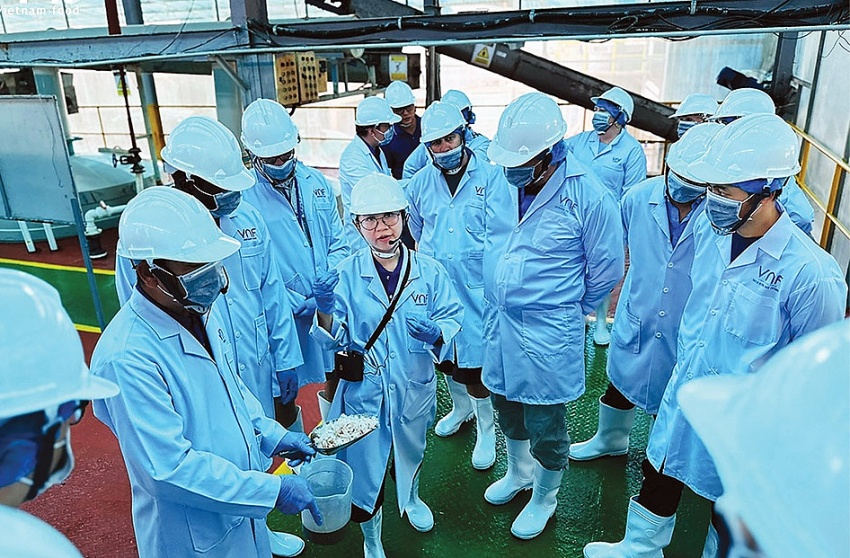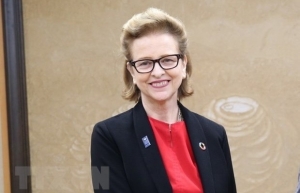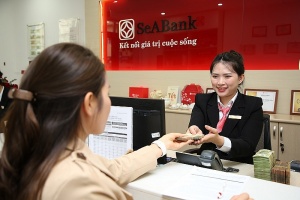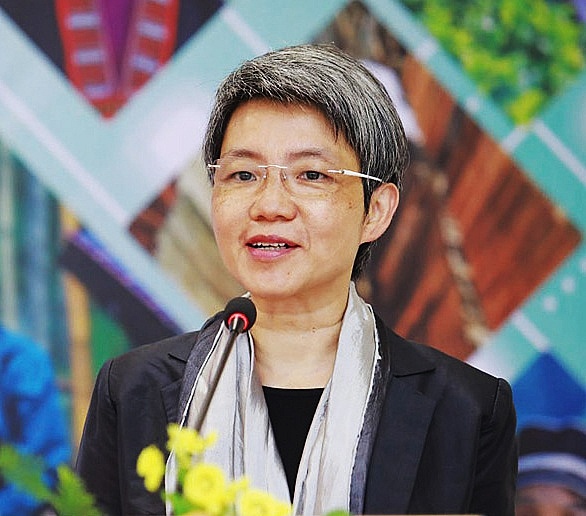Female influence still to be attained
At the Women in the Green Economy event in Hanoi on April 12, experts highlighted the intersection of gender inclusivity and climate action.
 |
According to Thomas Jacobs, the International Finance Corporation’s (IFC) country manager for Vietnam, Cambodia, and Laos, women’s full participation is vital in tackling climate change.
“Women’s leadership drives more ambitious and effective corporate action on climate change. Evidence shows that having more women in business leadership can reduce greenhouse gas emissions and resource consumption,” he noted, at the event, organised by the International Finance Corporation (IFC) and Global Energy Alliance for People and Planet with the Australian government and the US Agency for International Development.
“A study in 2013-2018 shows companies with greater board gender diversity were 60 per cent more likely to reduce energy consumption intensity and 39 per cent more likely to decrease emissions compared to those without,” Jacobs added. Additionally, he said that in 2023, the IFC committed nearly $9 billion in gender-lens investments and over $10 billion in climate finance globally.
When it comes to gender equality, Vietnam ranks 72nd out of 146 countries in the 2023 Global Gender Gap Report, with a gender parity rate of 71.1 per cent.
“While Vietnam’s Nationally Determined Contributions recognises gendered climate impacts, it lacks comprehensive gender integration into policy and climate financing frameworks that would enable gender-responsive implementation of climate projects,” said Franziska Deininger, the IFC’s global technical lead for Climate, Gender, and Economic Inclusion.
“A World Bank report in 2023 shows that female workers only account for 22 per cent of the jobs in green industries in Vietnam. They are also under-represented in potential green jobs, and even more so when agriculture is excluded,” she added.
Continuing disadvantage
Citing data from a study titled “The Unjust Climate” conducted by the Food and Agriculture Organization in 2024, Deininger argued that women are disproportionately affected by the impacts of climate change.
Specifically, a 1°C temperature increase correlates with a 34 per cent income reduction for female-headed households relative to male-headed households. Furthermore, in the wake of disaster or drought, girls are more likely to be removed from school or spend less time on schooling.
Women and other disadvantaged groups are also less likely to gain from new climate-related opportunities. More research by the IFC, on exploring opportunities for women entrepreneurs driving climate solutions and published in December, found that in emerging markets, sectors attracting the most climate investment are also where women are most underrepresented in business leadership.
However, some suggest that women can also be critical leaders and powerful changemakers in climate action and can improve mitigation and adaptation. Luong Nhu Oanh, gender and climate change analyst at UN Women, emphasised the significance of women taking an active role in climate action.
“Vietnam ranks 13th among countries most affected by climate change, with women being among the most vulnerable. As climate change depletes our resources, women must step up as agents of change, rather than remaining solely as victims,” she said.
Kristin Tilley, Australia’s Ambassador for climate change said, “The intersection of gender and climate has never been clearer. While it is clear that we need to achieve a clean future, it is much less clear that much more work is needed to boost women’s participation in our clean energy workforce.”
Tilley added that Australia set a target that 80 per cent of new development finance investments will effectively address gender equality. In addition, from July this year, it will introduce a new target that half of all new development finance investments over AUD$3 million ($1.9 million) must have a climate change objective.
Women in green sectors
Despite findings that women leaders are more inclined to take decisive corporate actions against the climate crisis, women remain underrepresented in climate-related sectors. At the COP28 climate summit, out of 140 scheduled speakers, only 15 were women. Analysis of COP28 delegations shows a gender imbalance of 62 per cent male to 38 per cent female, underscoring the persistent gender gap despite slight improvements from previous COP summits.
In Vietnam, the scenario mirrors this trend. According to Jessica Tran, country manager of green energy investment fund Clime Capital, women’s representation among climate startups remains low, with only 5 per cent of companies led by female CEOs or founders, and females constituting less than 30 per cent of the workforce, mainly in supporting roles like human resources and admin.
“These statistics underscore systemic challenges hindering women’s progress in clean energy startups,” she said. “The top three difficulties include recruiting and retaining senior leadership positions within women-owned businesses, a lack of expertise in various business aspects, and the ongoing struggle with work-life balance, particularly among Vietnamese women.”
Michele Wee, CEO of Standard Chartered Vietnam, addressed the issue of female representation in the banking sector, while emphasising that efforts are being made.
“In 2016, Standard Chartered had 26 per cent of female leadership. The bank went on to have a big campaign to actually drive up female participation. As of 2023, we had 32.5 per cent of female leadership in the bank, and by 2025, we’ll have 35 per cent. So the bank is definitely focused on gender equity,” she said.
On the other hand, the Standard Chartered Women International Network programme, which Wee hopes to soon be launched in Vietnam, is aiming to leverage the power of the bank’s unique global footprint to help women-led businesses grow.
“The programme will accompany these women, covering fortifying supply chains, attracting and retaining talent, and carrying out digitalisation and e-commerce. It’s not just about the extension of money, but really about understanding the market and understanding what it means to finding the right partners and doing it together,” she said.
These CEOs themselves are leading a movement. Both Tran and Wee are members of the Climate Leaders Network, comprising other C-suite and director-level women leaders in the climate forward sectors. The network aims to actively contribute to advancing the voice and visibility of women in climate action, as well as nurturing the next generation of female climate leaders.
| Le Kim Dung, country director CARE in Vietnam
A survey conducted by the World Bank across 190 countries reveals that each has at least one regulation hindering financial access for women-led businesses. In 18 countries, men are granted authority to impede their wives from working outside the home if they wish to do so. In addition, other non-financial barriers such as gender-based violence and the heavy burden of family caregiving responsibilities also pose challenges for women in accessing resources and prioritising career development. In Vietnam, small businesses are the backbone of the economy. Female entrepreneurs, in particular, are often better credit customers with lower default rates than their male counterparts, fast adopters of ecommerce, and proven to reinvest in their households and local communities. Out of the total of over 520,000 micro, small, and medium-sized enterprises in Vietnam, businesses owned by women account for approximately 20 per cent. When compared to other countries in the region, Vietnam is at the forefront in terms of the number of women-led businesses. However, almost 70 per cent of these businesses are classified as micro-enterprises, only 3 per cent are medium-sized, and the rest are classed as small in scale. This not only highlights the potential for further development within women-led business, but it also affirms Vietnam’s progressive policies aimed at promoting the contribution of women in the economy. In partnership with local financial service providers, business incubators and fintech partners, Strive Women in Vietnam takes a women-centered design approach to understand the needs of women entrepreneurs and deliver financial products and support services, such as capacity building, digital skills enhancement, and women’s network strengthening. In partnership with local financial service providers, business incubators and fintech partners, Strive Women in Vietnam takes a women-centered design approach to understand the needs of female entrepreneurs and deliver financial products and support services, such as capacity building, digital skills enhancement, and women’s network strengthening. With experience in supporting women worldwide, CARE understands that female entrepreneurship is a critical avenue through which we can support women’s economic empowerment. Women also put their profits back into their families, create more jobs and bring greater prosperity for their communities. Women’s entrepreneurship is a core component of CARE’s female economic empowerment program and a crucial tool to fight against poverty and gender inequality through addressing structural and social barriers, decision-making as well as investing in the capability, agency and business opportunities for women to have a sustainable impact on both gender equality and their economic status. Since 2020, we have partnered with several organisations to implement the Strive Women initiative, with a focus on women-led micro and small businesses as it aims to reach 2 million entrepreneurs in key regions of Vietnam in four years. The programme also innovates in areas such as climate crisis adaptation and childcare support. The Strive Women initiative’s partners have disbursed loans with a total value of over $64.1 million and provided direct support to tens of thousands of female entrepreneurs. The programme’s evaluation report in 2023 indicates that 80 per cent of participants from Vietnam have seen an increase in sales revenue, while 86 per cent have gained more confidence in managing their businesses. |
 | IFC and State Bank of Vietnam partner to promote women’s leadership in banking sector In a bid to increase the number of females in leadership positions at banks, World Bank Group member IFC and the State Bank of Vietnam (SBV) are partnering to promote innovative and impactful initiatives for sustainable and inclusive economic growth. |
 | UNDP commends Vietnam for “incremental progress” in promoting women’s leadership Vietnam is making incremental progress to increase women’s participation in elected bodies such as the National Assembly and local People’s Councils, UNDP Resident Representative in Vietnam Caitlin Wiesen affirmed in an interview with the Vietnam News Agency. |
 | Study reveals Vietnam’s banks need more women in leadership roles While women make up 60 per cent of the entry-level workforce in Vietnam’s banks, less than a third make it to senior management positions, according to a new study by the International Finance Corporation (IFC) in partnership with the State Bank of Vietnam (SBV). |
What the stars mean:
★ Poor ★ ★ Promising ★★★ Good ★★★★ Very good ★★★★★ Exceptional
 Tag:
Tag:
Themes: Empowering Women
- Female influence still to be attained
- Shaping Vietnam's corporate future: female board members show business excellence
- Nestlé Vietnam contributes to elevating the role of women across the supply chain
- Empowering female leaders in tech: insights and aspirations shared at KPMG Tech Innovator 2023
- Brighter Path programme hosts empowerment meeting for ethnic minority girls
Related Contents
Latest News
More News
- A golden time to shine within ASEAN (February 19, 2026 | 20:22)
- Vietnam’s pivotal year for advancing sustainability (February 19, 2026 | 08:44)
- Strengthening the core role of industry and trade (February 19, 2026 | 08:35)
- Future orientations for healthcare improvements (February 19, 2026 | 08:29)
- Infrastructure orientations suitable for a new chapter (February 19, 2026 | 08:15)
- Innovation breakthroughs that can elevate the nation (February 19, 2026 | 08:08)
- ABB Robotics hosts SOMA Value Provider Conference in Vietnam (February 19, 2026 | 08:00)
- Entire financial sector steps firmly into a new spring (February 17, 2026 | 13:40)
- Digital security fundamental for better and faster decision-making (February 13, 2026 | 10:50)
- Aircraft makers urge out-the-box thinking (February 13, 2026 | 10:39)

















 Mobile Version
Mobile Version